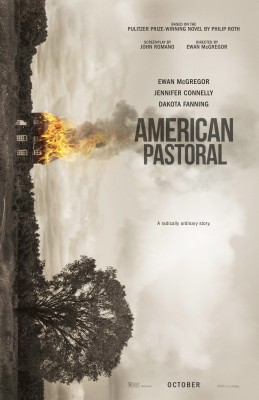In the battle of the missing children films, Pedro Almodóvar’s powerful new film Julieta takes the crown over Ewan MacGregor’s well-executed directorial debut American Pastoral.
Let’s bitch it out…Whether it is multiple films with the same actors (Amy Adams, Armie Hammer) or films that share a thematic or narrative link, I appear to be unintentionally seeing movies in pairs. Two prestige TIFF films – Julieta and American Pastoral – share a common thread: both films concern children who willingly abandon their former lives, leaving frantic and desperate parents to seek out their offspring for years on end. Both use a bracketing device to reveal their secrets, starting in the present with a story told to a proxy to draw audiences in before flashing back decades to provide the background context for the child’s disappearance.
Of the pair, Almodóvar’s film is stronger. I haven’t seen his recent efforts, but his best known (and most celebrated) films always seem to involve the complicated relationships between women, particularly mothers and daughters. Julieta fits firmly in this model, telling the tortured story of the titular character (Emma Suárez in the present, Adriana Ugarte in the past) whose daughter Antía abandons her without a word the summer of her eighteenth birthday. Told as a diary/journal entry for her missing daughter, the film jumps back thirty years to explore how Julieta met and fell in love with fisherman Xoan (Daniel Grao), how they began a family and how a tragedy caused a rift that destroyed everyone’s life. The film is a powerful mediation on guilt and love, confidently shifting back and forth between romantic melodrama and Hitchcockian thriller as the audience discovers the fateful family secrets that tore them apart.
What’s most remarkable about the film is Almodóvar’s willingness to pull back from his excesses in order to let his actresses breathe life into their roles. The direction, editing and trademark Almodóvar bursts of colour are all still present, but the technical specs are executed so effortlessly that they recede into the background in order to let the performances shine. Suárez is rightfully praised for balancing the most emotional, grief-fueled portion of the film, but Adriana Ugarte is the real find – young Julieta is spunky and sexy, both learned and naïve at the same time. I particularly like the meet-cute between young Julieta and her future husband on a frozen train. The sequence is both mesmerizing for its imagery (a stag who runs alongside the train, a late night sexual encounter in slow motion) and for its symbolic foreshadowing (an incident that fills Julieta with guilt winds up infecting her future relationships).
At its heart, Julieta is disarming in its simplicity – the film’s narrative is straight forward, but Almodovar’s craft and the talent in front of the camera create a film that lingers in the mind long after the credits roll.
American Pastoral on the other hand isn’t quite as successful. McGregor deserves applause for his solid direction of the Philip Roth adaptation, but the film itself is overdone and underwhelming. Starting at a 43rd high school reunion, a Jewish writer (clearly Roth’s stand-in narrator from the novel) played by David Strathirn learns the disarming downfall story of his HS hero, Swede (McGregor). In an American tale as old as time, Swede starts off with everything: trophy wife Dawn (Jennifer Connelly), successful business and beautiful daughter Merry, whose somewhat debilitating stutter is a mild cause for concern. Unfortunately for the family, Merry grows into a tempestuous teenage radical (Dakota Fanning) and, as the 60s progress, the girl becomes increasingly belligerent to her parents and dangerous in her convictions. On the same day that an explosion blows up the post office and kills a neighbour, Merry disappears, throwing Swede and Dawn’s life into chaos.
There are several major issues with the film, not the least of which is McGregor’s performance as an American ideal whose life disintegrates in front of him. Perhaps the strain of directing his first film pulled his focus, but there’s something unconvincing in McGregor’s portrayal, particularly when things get worse late in the film. Connelly doesn’t fare much better in a reductive, boring housewife role and her narrative arc is bland and predictable. Fanning, meanwhile, tries her best, but Merry is little more than a cipher: a cliché rebellious teen before the bombing and a stone-faced nut afterwards. It’s clear that the film believes it is making an ambitious statement about American values, the fight for equal rights and the complacency of the white middle class in the 60s, but it doesn’t work. American Pastoral is long, overstuffed and, worst of all, absolutely desperate to make audiences feel something (anything!). The music, in particular, is overwhelming, with too on-the-nose pop songs to underline exactly what we’re seeing and sweeping scores eager to increase the melodrama and induce tears.
It doesn’t work. But it usually looks pretty. So one out of two?
American Pastoral arrives in theatres in late October, while Julieta debuts in late December.

